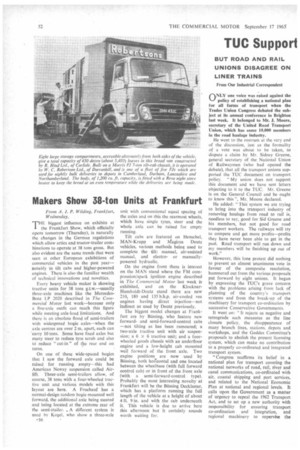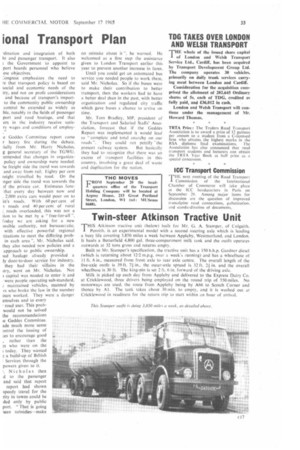TUC Support ional Transport Plan
Page 54

Page 55

If you've noticed an error in this article please click here to report it so we can fix it.
BUT ROAD AND RAIL UNIONS DISAGREE ON LINER TRAINS
From Our Industrial Correspondent
nNILY one voice was raised against the
policy of establishing a national plan for all forms of transport when the Trades Union Congress debated the subject at its annual conference in Brighton last week. It belonged to Mr. J. Moore, secretary of the United Road Transport Union, which has some 10,000 members in the road haulage industry.
He went to the rostrum at the very end of the discussion, just as the formality of a vote was about to be taken, to dispute a claim by Mr. Sidney Greene, general secretary of the National Union of Railwaymen (who had opened the debate), that all the transport unions supported the TUC document on transport policy. " My union does not support this document and we have sent letters objecting to it to the TUC. Mr. Greene is on the General Council and he ought to know this", Mr. Moore declared.
He added: "This system we are trying to bring into the transport industry of removing haulage from road to rail is, needless to say, good for Sid Greene and his members, but not good for road transport workers. The railways will try to compete and get more profits—profits they have never been able to get in the past. Road transport will run down and my members will be finishing up out of work."
However, this lone protest did nothing to prevent an almost unanimous vote in favour of the composite resolution, hammered out from the various proposals put forward by eight unions. It began by expressing the TUC's grave concern with the problems arising from lack of planning of the country's transport systems and from the break-up of the machinery for transport co-ordination by successive Conservative Governments.
It went on: "It rejects as negative and retrograde such measures as the line closure policy, the disappearance of many branch lines, stations, depots and workshops, and the Geddes Committee's proposals to abolish the present licensing system, which can make no contribution to a properly co-ordinated and integrated transport system.
"Congress reaffirms its belief in a national plan for transport covering the national networks of road, rail, river and canal communications, co-ordinated with air, coastal shipping and port services, and related to the National Economic Plan at national and regional levels. It calls upon the Government as a matter of urgency to repeal the 1962 Transport Act, and to set up a new authority with responsibility for ensuring transport co-ordination and integration, and regional machinery to supervise the -dination and integration of both ht and passenger transport. It also ; the Government to appoint to port boards personnel who believe ese objectives.
:'.ongress emphasizes the need to re that transport policy is based on social and economic needs of the try, and not on profit considerations and because of transport's importto the community public ownership control be extended as widely as ble, notably in the fields of passenger port and road haulage, and that ers in the industry receive satisry wages and conditions of employ"
e Geddes Committee report came
✓ heavy fire during the debate. 7ial ly from Mr. Harry Nicholas, g general secretary of the TGWU. :ontended that changes in organizapolicy and ownership were needed. he freight side the trend was towards and away from rail, Eighty per cent reight travelled by road. On the .nger side the trend was towards the 3f the private car. Estimates forethat every day between now and 2.000 extra cars would pour on to in's roads. With 60 per cent of 1 roads and 40 per cent of rural roads overloaded, this was not a lion to be met by a" free-for-all ". roday we arc asking for a new msible authority, not bureaucratic, with effective powerful regional lizations to meet the differing probin each area ", Mr. Nicholas said. they also needed new policies and a approach to public ownership.
tad haulage already provided a ly door-to-door service for industry. they had their villains in the ,try, went on Mr. Nicholas. Not capital was needed to enter it and were people operating sub-standard. ,■ maintained vehicles, manned by rs who broke the law in the number ours worked. They were a danger emselves and to every • road user. This probwould not he solved the recommendations Le Geddes Committee. ade much more sense ontrol the issuing of ...tes to encourage good , rather than the .T.s who were on the today. They wanted
▪ build-up of British
• Services through the powers given to it. Nicholas then d to the passenger and said that report report had shown speedy travel for the rity in towns could be ded only by public port. "That is going lean subsidies—make
no mistake about it ", he warned. He welcomed as a first step the assistance given to London Transport earlier this year to prevent another increase in fares.
Until you could get an automated bus service you needed people to work them, said Mr, Nicholas. So if the buses were to make their contribution to better transport, then the workers had to have a better deal than in the past, with better organization and regulated city traffic which gave buses a chance to arrive on time.
Mr. Tom Bradley, MP. president of the Transport and Salaried Staffs' Association, forecast that if the Geddes Report was implemented it would lead to "complete and total anarchy on our roads ". They could not petrify the present railway system. But basically they had to recognize that there was an excess of transport facilities in this country, involving a great deal of wasie and duplication for the nation.




















































































































































































